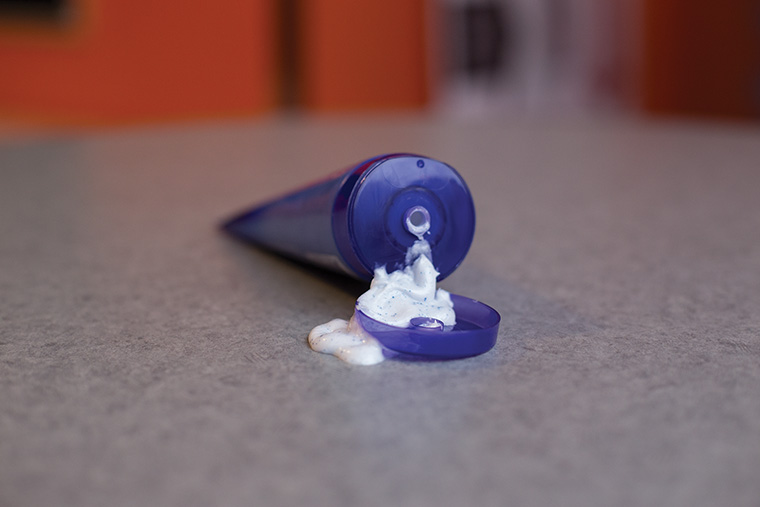State tries to scrub away microbeads
Photo Illustration by Anthony Soave
Microbeads
April 7, 2014
The tiny plastic beads found in exfoliating cleansers may unclog pores, but environmental researchers claim they also clog waterways, harm marine life and pollute local lakes, prompting state legislators to push for a bead ban.
The proposal, introduced March 14 by Sen. Heather Steans (D–Chicago), would outlaw the production and sale of microbeads used in cosmetic products, which are toxic and pollute the Great Lakes in addition to harming the marine wildlife that inadvertently consume them, according to Steans.
Major metropolitan cities contribute greatly to the high concentration of cosmetic microbeads in the Great Lakes, said Olga Lyandres, research manager at the Alliance for the Great Lakes.
The beads’ size makes it impossible for filters to eliminate them before water reaches lakes, according to Jennifer Caddick, engagement director at the Alliance for the Great Lakes. Though Chicago doesn’t discharge sewage into the lake, many cities do and the pollution from these other sources makes Chicago’s main water source a public health threat.
“Having this [proposal] in effect in Illinois, where a huge metropolitan area is located, is going to be a major step forward in terms of eliminating pollutants from Lake Michigan and local waterways,” Lyandres said.
The cosmetic microbeads not only pollute the lake but also harm acquatic wildlife, said Stiv Wilson director of Communications and Campaigns at 5 Gyres, an environmental organization that researches the impact of plastics. He added that microbeads resemble fish eggs, often tricking marine species into ingesting them.
The 5 Gyres regularly analyzes the micro-plastic substances fish ingest, and the group found high concentrations of microbeads in the intestines of aquatic animals. In Lake Erie, every square kilometer contained as many as 43,000 microbeads. Not only does eating microbeads harm species, but it also puts humans at risk of consuming plastic unknowingly when they eat fish caught in the lake.
Microbeads are designed to go through drains, said Wilson. Microbeads easily absorb pollutants present in the water, increasing their toxicity, he said, adding that their plastic base is cheaper than organic products.
“Most people do not know these beads are made of plastic,” Wilson said. “People freak out when they realize they’re washing their face with plastic. Regardless of a person’s environmental concern, they do not want plastic on their face.”
Steans’ proposal was inspired by a 5 Gyres national awareness campaign about the environmental dangers of cosmetic microbeads. Wilson said 5 Gyres has also been working on microbead bans with legislators in New York and California.
Wilson said 5 Gyres approached three major cosmetic companies—Johnson & Johnson, The Body Shop and Procter & Gamble—to request that they stop using the beads, which yielded some success. Johnson & Johnson in Wilmington, Ill., plans to cease manufacturing microbeads, beginning the removal process in 2015. Body Shop and P&G have also agreed to eventually cease manufacturing microbeads.
“We have stopped developing new products containing microbeads and have been conducting environmental safety assessments of other alternatives,” said Carol Goodrich, spokeswoman for Johnson & Johnson,in an emailed statement.
Though some companies have willingly agreed to stop using the beads, Wilson said 5 Gyres began pursuing legislative action to ban microbeads because they want manufacturers to be accountable and face penalties if they do not comply.
The Personal Care Products Council, a national trade association for cosmetic products, supports the ban but also urges policy makers to give business owners adequate time to phase out the beads, said Halyna Breslawec, chief scientist for the Personal Care Products Council, in an emailed statement.
Mark Denzler, vice president of the Illinois Manufacturers’ Association, said he worked with Steans and manufacturers to ensure a reasonable date was set to efficiently remove beads from the products in question.
Although Denzler and Steans determined that the Dec. 1, 2015 deadline would be sufficient, Steans said it would extend the deadline if businesses need more time.
Despite concerns that the ban would go into effect too soon, most companies have not disputed it because microbeads can easily be replaced with organic materials, Wilson said.
“It’s the bill that has taken the country by storm, and I there is not a good counterargument,” Wilson said.
The Senate will vote on the bill from April 7–11 to decide if it will move forward to the House of Representatives.








